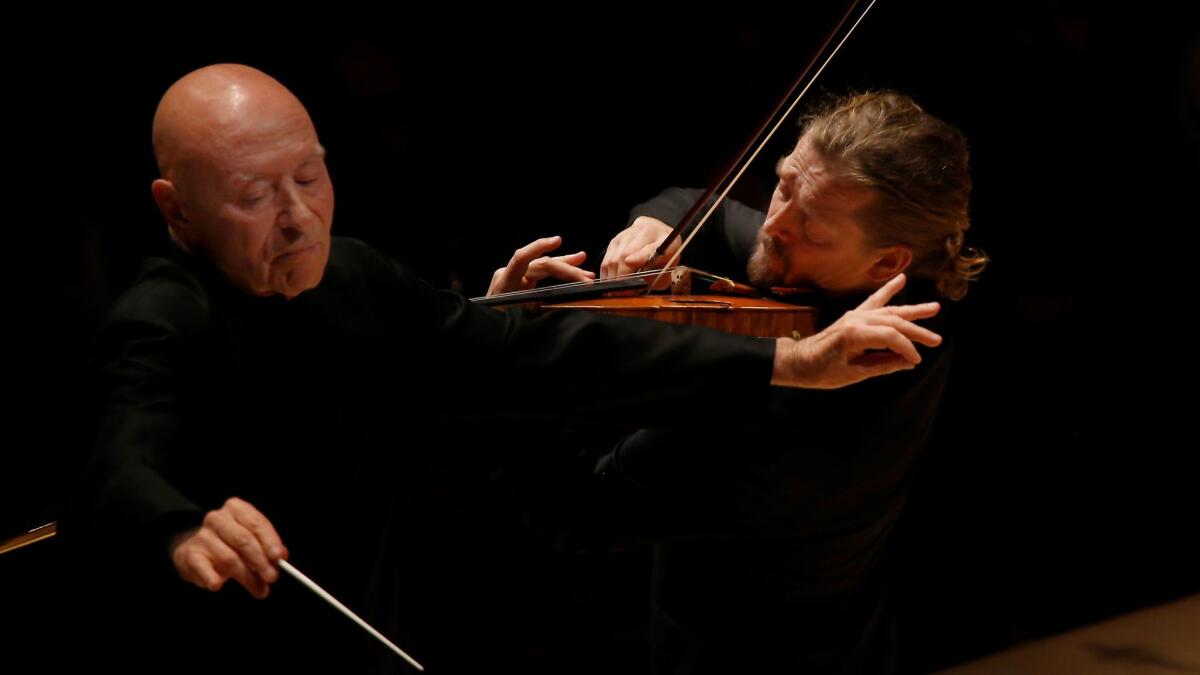Review: Brahms played brilliantly, with an L.A. back story to boot: Christoph Eschenbach at Disney Hall

An awful lot of Brahms has been performed around town lately for no particular reason, and Christoph Eschenbach — fresh off a local appearance last month with the touring Bamberg Symphony — arrived at Walt Disney Concert Hall with more. The three-concert run ending Sunday didn’t offer the usual Brahms, however, and it came with a back story rooted here in Los Angeles.
Let’s whisk back to 1937, when recently arrived emigré Arnold Schoenberg was urged by the Los Angeles Philharmonic’s then-music director, Otto Klemperer, to transcribe music for an all-Brahms program. Schoenberg wrote a lavish orchestration of Brahms’s Piano Quartet in G Minor, Op. 25, for a large ensemble, and Klemperer and the Phil gave the world premiere in the old Philharmonic Auditorium in May 1938.
A bootleg-quality recording of the performance still exists. The sound is awful, and there are a few gaps in the performance due to problems with the transcription discs. But you can just make out the outlines of the performance. You would be hard-pressed to connect the driven, knockabout Klemperer on these discs with the legendarily monolithic defender of the German classics in his old age. And after hearing the L.A. Phil’s brilliantly played live performance under Eschenbach on Friday night, it’s clear how far along the orchestra has come in the world since.

The Los Angeles Philharmonic’s YOLA holds a 10th anniversary tour with stops in Northridge, Visalia, Fresno and Oakland.
SIGN UP for the free Essential Arts & Culture newsletter »
It has taken awhile for the orchestrated Piano Quartet to catch on over the objections of Brahms purists, but it’s no longer a rare novelty; Simon Rattle and the Berlin Philharmonic brought it here in 2009. It’s not “Brahms’ Fifth Symphony,” as Schoenberg once joked; it is blown-up chamber music with fewer working parts than one would find in, say, a real symphony.
But Schoenberg’s orchestration is always a blast to hear — particularly the Rondo alla Zingarese finale, where indeed he puts a lot of zing into the zingarese with clattering xylophone, col legno effects (the wood of the bows beating on the strings) and other flamboyant ideas. Eschenbach, who conducted the piece from memory, relished the raucous elements and realized the humor with help from the orchestra’s brasses. He also could be richly expressive, making the most of what dynamic contrasts there were. The musicians looked like they were having a grand time.
Earlier in the program, there was something of a premonition of the Brahms-Schoenberg energy to come when Eschenbach ripped into Dvorák’s “Carnival” Overture. The middle section could not have been more peaceful, and it ended on an even higher level of combustion.
The wide contrasts between wildness and contemplation continued with Christian Tetzlaff’s performance of the Dvorák Violin Concerto, which isn’t heard nearly as often as the composer’s Cello Concerto. After a tempestuous first movement, Teztlaff occasionally drifted over the line into sentimentality in the second movement, and his tone quality turned raw in the multiple stops in the finale, though he maintained good intonation throughout the piece. A Romantically inclined, even sly rendition of the Gavotte en Rondeau from J.S. Bach’s Partita No. 3 was Tetzlaff’s encore.
Follow The Times’ arts team @culturemonster.
ALSO
The Industry’s opera on a San Pedro beach among winners of Mike Kelley Foundation grants
The Calder Quartet rolls along with Beethoven
Cameron Carpenter unleashes his International Touring Organ at CAP UCLA
In a startling coup, New York lures L.A. Phil chief Deborah Borda
More to Read
The biggest entertainment stories
Get our big stories about Hollywood, film, television, music, arts, culture and more right in your inbox as soon as they publish.
You may occasionally receive promotional content from the Los Angeles Times.










